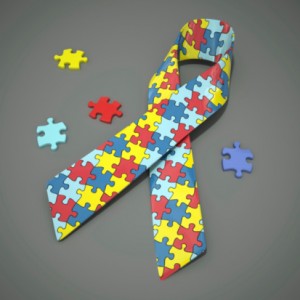How You Can Help Families Affected By Autism
 You probably have seen and heard that April is Autism Awareness Month. The “ribbon” for autism looks like it’s made up of jigsaw puzzle pieces, and some people have been wearing clothing with the puzzle symbol or decorating their Facebook profiles with the design. By now, most of us are very aware of autism; according to Autism Speaks, the disorder affects approximately one in 88 children, and one in 54 boys. This means that chances are, your child has or will have a child with autism in his or her class at some point during elementary school. You might be wondering how you can help families affected by autism. Here are some tips:
You probably have seen and heard that April is Autism Awareness Month. The “ribbon” for autism looks like it’s made up of jigsaw puzzle pieces, and some people have been wearing clothing with the puzzle symbol or decorating their Facebook profiles with the design. By now, most of us are very aware of autism; according to Autism Speaks, the disorder affects approximately one in 88 children, and one in 54 boys. This means that chances are, your child has or will have a child with autism in his or her class at some point during elementary school. You might be wondering how you can help families affected by autism. Here are some tips:
-
Be compassionate. Children with autism often behave in ways that you might not expect from a child that age. If you see an older child having a meltdown at the grocery store, for example, you have no way of knowing if he has a sensory disorder or other form of autism. Be compassionate to families that you see struggling. Give the mom or caregiver a smile instead of ignoring her, or worse, giving a look of contempt. Ask quietly if there’s anything you can do to help. While you may not be able to actually help the child, she might be relieved if you let her cut in front of you in line, or if you could push her carriage off to the side while she takes her child outside. Have patience with children who are acting in what you might think is not an age-appropriate way, as you probably don’t know the full story.
-
Talk to your child about autism. She might already know about the disorder if she has a classmate who is affected, but regular conversations can help her to understand. It’s important to families affected by autism to see that their child is accepted. Encourage your kids to invite classmates with autism to birthday parties or on playdates. Often kids with this type of disorder are ignored by classmates because they might not have the social skills that the other kids have. I remember going to the birthday party of a child with autism and having my kids be the only guests at the party who showed up. Don’t let this happen to one of your child’s classmates.
-
Talk to your friends who have children with autism. If you have questions about what your friend’s child is able to do or not do, it’s usually better to ask in a caring way than to leave the child out of activities. All children with autism are not alike, and the condition affects each child differently. A child who is not verbal, for example, still may have a great time at the park, whereas a child with a sensory processing disorder may be too overwhelmed by a noisy or crowded gathering, but be just fine with a one-on-one playdate with a relatively quiet child.
You can make a difference for families in your area who are affected by autism. By having compassion and patience with children with special needs, and by encouraging your children to do the same, you can make new friends and help families to fit into the school, neighborhood or community.









This is a very thoughtful and compassionate posting. It serves as a good reminder of how prevalent autism is, and what we can do to help families with autistic children (e.g. giving caregivers a smile instead of ignoring them when their children have public meltdowns).
Hopefully postings like yours and many others will help to eliminate what’s left of the social stigma of autism in the world.